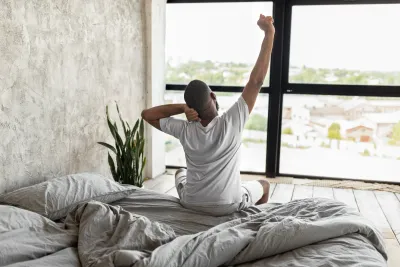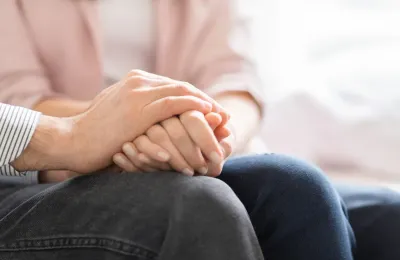
Key Takeaways
Caffeine typically lasts 6 to 8 hours in the body, but its effects can linger longer depending on dosage, genetics, and when it is consumed.
- Caffeine typically stays active in the body for 4–6 hours, meaning an afternoon coffee can still impact nighttime sleep.
- Consuming caffeine too late in the day can delay sleep onset and reduce time spent in deep and REM sleep.
- Caffeine metabolism varies by person and is influenced by genetics, age, liver function, pregnancy, smoking, and lifestyle factors.
- Most healthy adults can tolerate up to 400 mg of caffeine per day, but teens, children, and pregnant individuals should consume much less.
- Cutting off caffeine earlier in the day, staying hydrated, and choosing caffeine-free options in the afternoon can support better sleep and next-day energy.
If you’ve ever found yourself wide-eyed at 1 a.m. after a seemingly innocent afternoon latte or energy drink, you’re not alone. Caffeine is the most popular stimulant in the world, and it stays in your body longer than you might think.
Caffeine may seem like a quick fix, but its effects can last for several hours, depending on various factors. But how long does caffeine last in your system? And more importantly, when should you cut yourself off to avoid disrupting your sleep?
Below, we’ll break down how long caffeine stays in your system, how caffeine works in your body, how long it takes to wear off, and the surprising factors that affect its duration.
Whether you’re a coffee lover, an energy drink fan, or just wondering why you’re still feeling wired hours after that afternoon pick-me-up, we’ve got the straightforward, science-backed answers you’re looking for.
Did You Know: Research suggests roughly 85–94% of adults reach for a caffeinated drink on a regular basis, and about 64% make it part of their daily ritual. [1]
Sleep Smarter. Cooler. Better.
Let the Chilipad bed cooling system and cooling mattress topper help you outsmart late-day caffeine and restless nights. With precise temperature control, you can create the perfect sleep environment, cool, calm, and caffeine-free.
How Caffeine Works in Your Body
Ever notice how that first sip of coffee seems to wake you up almost instantly? That’s caffeine doing its job. After you drink it, it quickly enters your bloodstream, usually within 15 to 45 minutes.
Then it heads straight to your brain, where it blocks adenosine receptors, a chemical that normally makes you feel tired. The result? You feel more awake, sharper, and definitely less tempted to doze off during that long afternoon Zoom call.
That’s why so many of us reach for a cup of coffee, soft drink, black tea, or an energy drink to help power through a morning meeting or shake off that common midday slump.
But, if you find yourself drinking too much caffeine, there are options such as green tea and decaffeinated coffee, which are great, as they still give you the cozy vibes without the jittery side effects.
Tip: Avoid consuming caffeine later in the day. If you do, pair it with a healthy snack to help slow its absorption.
Caffeine Half Life: The Science of the Slow Fade
It doesn’t clock out the moment you finish your cup; it hangs around. The "half life" of caffeine consumed (aka the time it takes your body to clear out half of what you consumed) is typically around 4 to 6 hours.
So if you sip a 200 mg coffee at 2 p.m. or an energy drink after a workout, you’ll still have about 100 mg circulating in your system by dinner.
And the rest of the caffeine? The effects of caffeine can take 10 hours, or even longer, to fully clear your system. That’s why even a seemingly harmless afternoon latte or caffeinated beverage can continue to interfere with your sleep long after bedtime.
What That Means for Your Body Over Time
- 6 Hours In: You’ve still got about 50% of that caffeine cruising through your system.
- 12 Hours Later: Around 25% is still hanging out, just enough for some to potentially suffer interrupted sleep.
- 24 Hours Later: Yep, you might still have about 12.5% lingering, depending on your metabolism, lifestyle, and genetics.
Tip: The American Academy of Sleep Medicine recommends avoiding caffeine at least six hours before bedtime to prevent sleep disturbances.
How Long Does Caffeine Take to Wear Off?
Caffeine might give you that much-needed energy boost, but it sticks around longer than you’d think. On average, caffeine has a half life of about 5 to 6 hours. This means it takes that long for just half of it to leave your system.
So, that 3 p.m. coffee could still be affecting your sleep come bedtime.
If you’re sensitive to caffeine or struggling with falling asleep and staying asleep, aim to cut off consumption by early afternoon. Your future well-rested self will thank you.
What Determines How Long Caffeine Lasts
Not everyone processes it in the same way, and a few key factors can significantly influence caffeine metabolism, affecting how your body breaks it down and how long the effects last.
- Genetics & Metabolism: Your DNA plays a big role. Most people are born fast metabolizers, while others break down caffeine at a slower pace.
- Age & Body Weight: Generally, the younger you are, the quicker your body processes it. Older adults tend to metabolize it more slowly.
- Pregnancy: Caffeine sticks around longer during pregnancy, thanks to hormonal shifts that slow down metabolism.
- Smoking vs. Non-Smoking: Smokers actually metabolize caffeine faster than non-smokers, just one of many interesting side effects.
- Liver Function: Since your liver does the heavy lifting in breaking down caffeine, a healthy liver means more efficient processing.

Caffeine Timeline in the Body
Caffeine does not wear off as quickly as most people think. After you consume it, caffeine moves through your system in predictable phases that can affect alertness and sleep for hours.
- 15 to 45 minutes: Caffeine enters the bloodstream and begins to block adenosine, the chemical that promotes sleepiness. This is when you start to feel more alert and focused.
- 2 to 4 hours: Caffeine reaches peak levels in the body. Energy and concentration are at their highest, but this is also when jitteriness or restlessness may appear for some people.
- 6 to 8 hours: This is the average half life of caffeine for most adults. About half of the caffeine you consumed is still active in your system, which can interfere with falling asleep if consumed too late in the day.
- 10 plus hours: Residual caffeine can remain in the body, especially for sensitive individuals. Even if you fall asleep, lingering caffeine may reduce deep and REM sleep quality.
Learn more about how to increase REM sleep and get more deep sleep naturally.
How Caffeine Affects Sleep Quality and Sleep Onset
Knowing how long caffeine lingers in your system is important if you care about getting quality sleep. Drink coffee or other drinks such as milk chocolate, too late in the day, and you might end up in the dreaded “wired but tired” zone.
This is when your brain’s running in overdrive, but your body’s begging for rest.
Caffeine doesn’t just delay sleep; it can interrupt your REM and Deep Sleep stages too. Even if you do fall asleep, it might not be the kind of restorative sleep your body actually needs.
Want to dive deeper into how caffeine affects your sleep cycles? Check out our blog on how caffeine impacts your sleep quality.
A consistent lack of quality sleep is tied to serious health problems, including high blood pressure and obesity, making a good night's rest essential
How Much Caffeine Is Safe Per Day
It can be your best friend on groggy mornings, but like most good things, it’s best in moderation. According to the FDA, up to 400 mg of caffeine per day is considered safe for most adults.
That’s roughly the amount in four 8-ounce cups of brewed coffee, or a couple of strong lattes. However, keep in mind that your tolerance may differ from someone else’s. Most people can feel jittery after just one cup, while others can consume it all day and still fall asleep on the couch.
Here’s a quick breakdown of the recommended daily caffeine limits:
- Adults: Up to 400 mg per day. This results in 4 cups of coffee, 10 cans of soft drinks, or 2 energy drinks.
- Pregnant Women: Keep it to 200 mg or less. This amount results in 2 cups of coffee.
- Teenagers: No more than 100 mg, resulting in 1 small coffee or one 12-oz can of their favorite soft drink.
- Children: Ideally, skip it altogether, but if they do consume caffeine, it should be in very small amounts. It can be an occasional dark chocolate or a few sips of soda.
Going over these limits can lead to some pretty unpleasant side effects, like feeling anxious, having trouble sleeping, an upset stomach, or a racing heart.
That extra cup of black coffee at 3 p.m. might feel like a good idea in the moment, but your late evening self will probably disagree.
The caffeine content is highly variable, influenced by many factors such as the kind of coffee beans used, where they're grown, how finely they're ground, and the time and temperature of the brew.
Signs You Are Getting Too Much Caffeine
If you’re starting to feel like it’s running the show, or it’s interfering with your sleep, it might be time to ease off drinking caffeine.
The good news?
You don’t have to quit cold turkey and face caffeine withdrawal symptoms (unless you really want to test your willpower).
Here’s how to scale back on your caffeine consumption without feeling like a zombie and avoid the common withdrawal symptoms:
- Set a Curfew: Try to cut off your intake by 2 p.m. That gives your body time to wind down before bed.
- Go Slow, Not Solo: Instead of quitting all at once (this can result in headaches), reduce your consumption gradually. Start by swapping your afternoon cup for half-caf or green tea.
- Hydrate Like a Pro: Drinking water helps your body metabolize and flush out caffeine faster. Plus, staying hydrated keeps your energy up naturally.
- Explore Caffeine-Free Swaps: Craving that warm, cozy mug? Try herbal teas, decaf coffee, or trendy alternatives like roasted chicory root or golden milk.
Minor adjustments can make a big difference, just like starting a new diet or exercise program. Ease into changes slowly, and your sleep (and central nervous system) will thank you.
Final Thought
Caffeine is a trusty sidekick for many of us, helping to increase alertness and powering us through early meetings, mid-afternoon slumps, and late-night deadlines. But as you’ve probably noticed by now, caffeine’s effects don’t just fade away as quickly as that initial energy boost suggests.
From how it blocks sleep-inducing chemicals in your brain to how long it takes your body to metabolize it, caffeine is one substance that doesn’t just clock out when you do.
Everyone’s caffeine tolerance and metabolism are different, and some people may be more sensitive to caffeine, which means your best friend’s 5 p.m. espresso might be your 1 a.m. regret. Whether you're trying to improve your sleep, reduce jitteriness, or simply be more mindful of your intake, the key is awareness —and most importantly, timing.
The effects of caffeine vary, so the next time you reach for that afternoon coffee or energy drink, pause for a second and ask: Will this help me now, or haunt me later?
If cutting back sounds intimidating, don’t worry, you don’t have to ditch it entirely. A few smart swaps and tweaks can make a big difference without leaving you feeling like a sleepy robot.
Frequently Asked Questions About Caffeine and Sleep
How late can I drink caffeine?
For most people, it is best to stop caffeine at least 8 hours before bedtime. Sensitive sleepers may need a 10 to 12 hour cutoff to avoid sleep disruption.
Why Does Caffeine Affect Some People More than Others?
Caffeine isn’t a one-size-fits-all stimulant—it’s more like a custom filter running through your body’s unique hardware. Genetics play a big role: some people metabolize caffeine quickly, while others process it at a snail’s pace, leaving them jittery for hours.
Add in factors like age, body weight, tolerance, and even medications, and you’ve got a recipe for wildly different reactions. That’s why one person’s harmless afternoon espresso is another’s midnight staring contest with the ceiling.
What’s a Safe Amount of Caffeine per Day?
For most healthy adults, the sweet spot is up to 400 milligrams of caffeine per day—roughly the equivalent of four 8-ounce cups of coffee. That’s enough to boost alertness and focus without tipping into the shaky-hands, racing-heart territory. But remember, caffeine hides in more than just coffee—think tea, soda, energy drinks, and even chocolate—so your daily tally can add up faster than you realize. If you’re pregnant, sensitive, or dealing with certain health conditions, your safe limit may be lower.
Ask ChatGPT
How long does caffeine last in adults?
In most adults, caffeine lasts 6 to 8 hours, though residual effects can remain for 10 hours or more depending on sensitivity, dose, and metabolism.
Can caffeine affect sleep even if you fall asleep?
Yes. Caffeine can reduce sleep quality by increasing nighttime awakenings and limiting deep and REM sleep, even if you fall asleep easily.
Peer-Reviewed Research References
-
Mitchell, D.C., et al.
An Update on Beverage Consumption Patterns and Caffeine Intake.
Appetite, 2025.
Study Type: Population Consumption Analysis
Key Finding: Indicates that caffeine intake has risen in recent years alongside shifts in beverage consumption patterns, with implications for sleep onset and sleep quality because caffeine is a central nervous system stimulant.:contentReference[oaicite:1]{index=1}
View Study
Source URL: https://www.sciencedirect.com/science/article/pii/S0278691525000031









